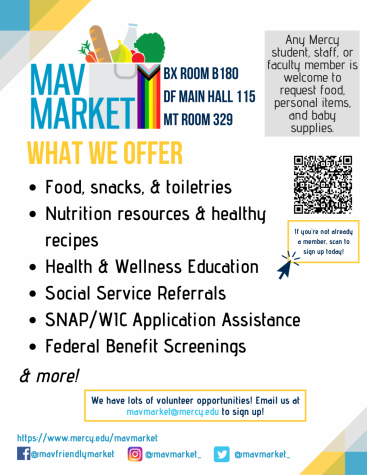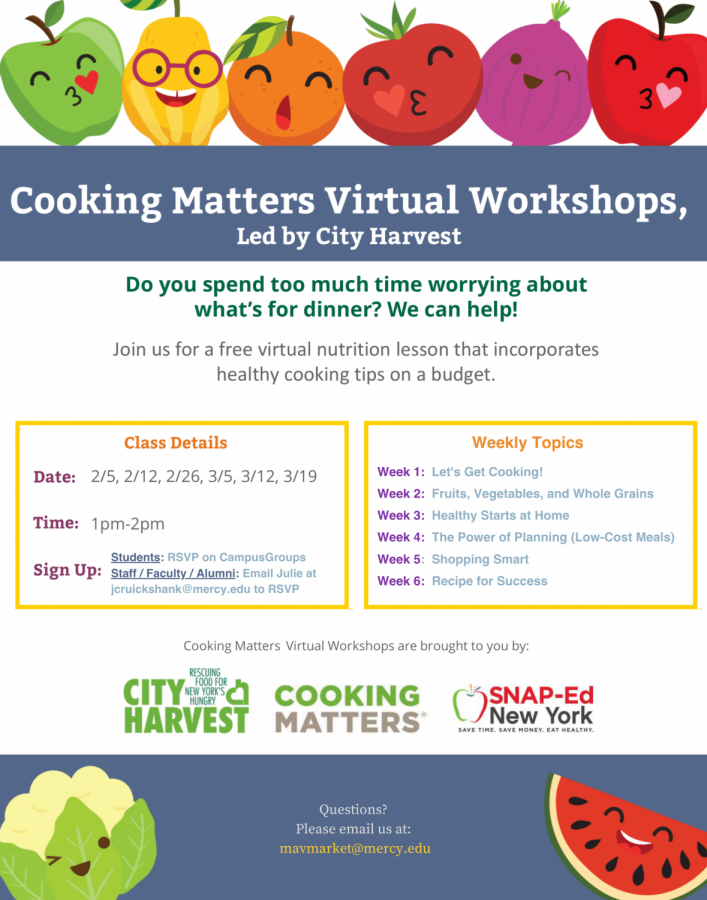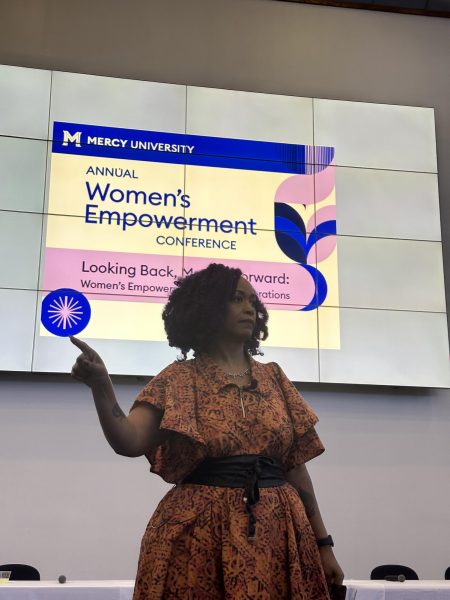Cooking Matters: Nutrition On a Budget
College time can be a very demanding period, especially during exam weeks and the end of the semester. Faced with this, Mercy College Mav Market promotes the idea of cultivating lifestyle habits that contribute to the student community’s psychological and physical well-being with the new workshop, “Cooking Matters,” hosted by City Harvest.
“As a fellow intuitive eater, telling yourself ‘no’ to certain foods will cause you to want it more. I believe people need to lose the label of ‘good’ and ‘bad’ foods to find peace with food,” said Sofia Gilary.
Gilary is a nutrition and culinary education manager. She graduated in 2019 with a nutrition degree and is in the process of becoming a dietician. Gilary will host the workshops and will be demonstrating some tips on how to cook through virtual lessons.
“The goal is to teach people how to eat healthy on a low budget and learn culinary skills. This means learning how to cook with canned, frozen, and fresh fruits and vegetables. Also learning basic knife and safety skills.”
A healthy diet is the basis for an adequate quality of life. For college students, a good diet is the key to a great performance on day-to-day tasks.
The workshop will consist of a series of activities led by Gilary. These activities will cover many topics:
- Tools that students can use to choose and prepare healthy foods at home.
- Encourage students to incorporate more fruits, vegetables, and whole grains into their meals.
- Advise students on how they can make smart choices when food shopping.
- Encourage participants to plan healthy, low-cost meals to make the most of their food dollars.
The free workshops begin on February 5th, and its virtual lessons will occur every Friday from 1 p.m. to 2 p.m. until March 19th.
An advantage of this workshop is its tips for students on a budget.
The healthiest diets cost about $1.50 more per day than the less healthy diets, according to new research from the Harvard School of Public Health (HSPH). Over the course of a year, $1.50/day more for eating a healthy diet would increase food costs for one person by about $550. This means that for a family of four, that would be about $2,200 more a year.
“Buying healthy food is more expensive than going to a fast-food restaurant, but cooking a healthy dish yourself isn’t,” suggested Gilary.
However, if students have difficulties getting food, they can always become a member of the pantry resource provided by Mercy College, the Mav Market.
Any students, staff, or faculty members can go to the Mav Market during open hours and do their shopping. Each product has a point value, and through the point system, based on the number of family members, students get a certain number of points to spend on their weekly purchases. They provide wholesome foods, personal care items, and pet food for students and their families.
“We rely on donors, but we also have a partnership with The Food Bank of NYC, Feeding Westchester, and City Harvest,” said Julie Cruickshank, the Mav Friendly Market Program Coordinator.
Mercy College provides food each year for around 800 people. There is no qualification to become a member. People’s applications are confidential, and anyone can go shopping and grab what they need, “even if it is just a snack between classes,” said Cruickshank. During the strongest months of the pandemic, people ordered online, and the Mav Market prepared packages to avoid the accumulation of people; however, now, they are open again for walk-in shopping.
In case students are interested in the workshop but can not attend it, Gilary has some tips, to begin with. “Fruits and vegetables should be the most on your plate,” she shares. “Carbohydrates aren’t bad either! They are your brain’s number one source of energy. Learn to respect your body’s hunger cues. We have these for a reason. If you are craving more protein, eat it, more grains, go have a slice of bread.” In fact, according to livestrong.com, research has shown that students are able to learn better when they’re well-nourished, and eating healthy meals has been linked to higher grades, better memory and alertness, and faster information processing.

Daniela was born and raised in Barcelona, Spain. In the fall of 2016, she moved to the US with her family. This became a major turning point in Daniela’s...













